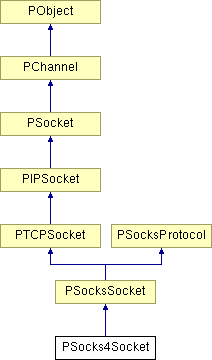
#include <socks.h>
Inheritance diagram for PSocks4Socket:

Public Member Functions | |
| PSocks4Socket (WORD port=0) | |
| PSocks4Socket (const PString &host, WORD port=0) | |
| virtual PObject * | Clone () const |
Protected Member Functions | |
| virtual PBoolean | SendSocksCommand (PTCPSocket &socket, BYTE command, const char *hostname, PIPSocket::Address addr) |
| virtual PBoolean | ReceiveSocksResponse (PTCPSocket &socket, PIPSocket::Address &addr, WORD &port) |
| PSocks4Socket::PSocks4Socket | ( | WORD | port = 0 |
) |
| PSocks4Socket::PSocks4Socket | ( | const PString & | host, | |
| WORD | port = 0 | |||
| ) |
| virtual PObject* PSocks4Socket::Clone | ( | ) | const [virtual] |
Create a copy of the class on the heap. The exact semantics of the descendent class determine what is required to make a duplicate of the instance. Not all classes can even do a clone operation.
The main user of the clone function is the PDictionary class as it requires copies of the dictionary keys.
The default behaviour is for this function to assert.
Reimplemented from PTCPSocket.
| virtual PBoolean PSocks4Socket::SendSocksCommand | ( | PTCPSocket & | socket, | |
| BYTE | command, | |||
| const char * | hostname, | |||
| PIPSocket::Address | addr | |||
| ) | [protected, virtual] |
Reimplemented from PSocksProtocol.
| virtual PBoolean PSocks4Socket::ReceiveSocksResponse | ( | PTCPSocket & | socket, | |
| PIPSocket::Address & | addr, | |||
| WORD & | port | |||
| ) | [protected, virtual] |
Reimplemented from PSocksProtocol.
 1.5.1
1.5.1